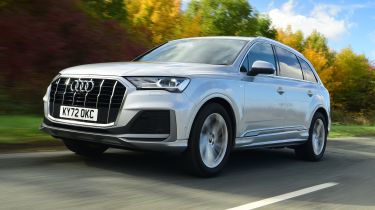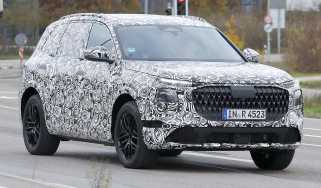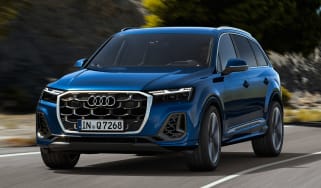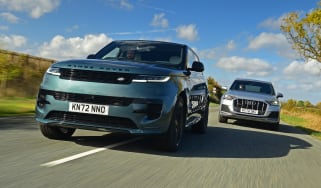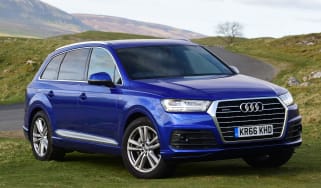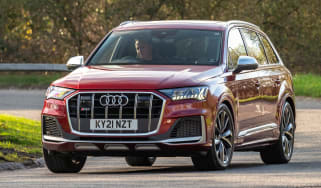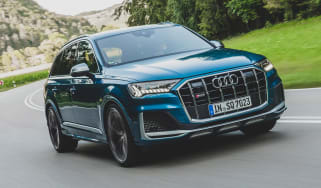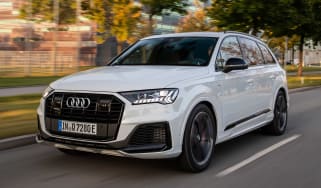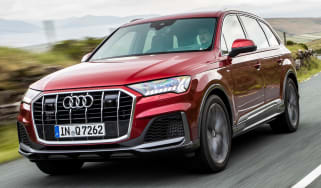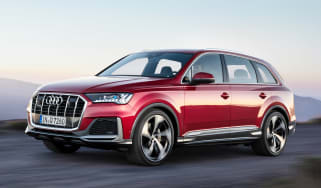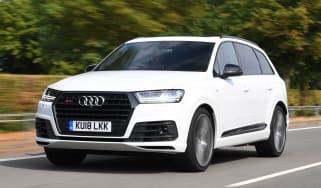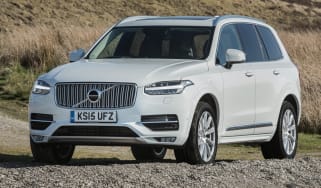Audi Q7 review
The Audi Q7 luxury SUV is practical and packed with hi-tech features, while it's still capable enough of mixing it with premium rivals

The Audi Q7 is one of the best luxury SUVs on sale; capable of taking on similarly modern rivals like the BMW X5 and Mercedes GLE, while holding its own against premium 4x4s such as the Range Rover Sport. It’s great to drive too, expertly blending a plush ride with sure-footed grip, traction and body control.
The cavernous interior offers plenty of space for seven and all models are well-equipped, however plug-in hybrid models are no longer part of the Q7 line-up in the UK.
About the Audi Q7
Although a latecomer to the premium SUV class, the Audi Q7 certainly made an impact when it arrived. Launched in 2007, the original stood out thanks to its imposing dimensions and spacious seven-seat layout, where most of its rivals were only five-seaters.
Then, in 2015, the second-generation Q7 arrived. The Q7 Mk2 offers the same levels of quality as the original but in a less-weighty package. It was also the first model to use the VW Group's MLB platform, sharing its basic structure with the Bentley Bentayga, Porsche Cayenne, Volkswagen Touareg and even the Lamborghini Urus. However, all of these models are differentiated by their own unique DNA, and the Audi benefits from the German brand's image and its focus on technology.
Used - available now
The Q7 got a comprehensive update in 2019 – a sharper look and more luxurious interior were introduced along with new mild-hybrid petrol and diesel engines. A dual-screen infotainment system dominates the redesigned interior and there’s a focus on high-tech luxury; Audi made these changes to make sure that its largest SUV kept pace with key rivals like the Mercedes GLE, BMW X7 and Range Rover Sport. Other rivals include the BMW X5, Land Rover Discovery, Lexus RX and Volvo XC90.
For a time, Audi offered two plug-in hybrid versions of its seven-seater SUV badged as the 55 TFSI e and 60 TFSI e. They're no longer available to order in the UK, however we could see one or both return as the Q7 is due to receive a second facelift in the near future to help extend its lifespan.
But for now, the standard engine line-up consists of two diesels and one petrol – the 45 TDI, 50 TDI and 55 TFSI respectively. The diesels are mild-hybrid 3.0-litre V6 units with 228bhp and 282bhp; the petrol also uses a 3.0-litre V6 with mild-hybrid tech and produces 335bhp. The range-topping SQ7 is powered by a brawny 4.0-litre V8 petrol, making 500bhp – although earlier SQ7s packed a torquey diesel engine.
There are three trim levels on offer: S line, Black Edition and Vorsprung. Standard equipment is generous, with LED headlights, adaptive air suspension, Audi Drive Select and leather upholstery all included. Audi’s MMI Navigation Plus infotainment system works across a total of three displays – two in the middle and one behind the steering wheel in place of traditional dials. There’s a good level of safety features too, including a rear-view camera, cruise control, automatic emergency braking and all-round parking sensors. Android Auto and Apple CarPlay are also standard across the range.
S line cars get a unique look with more body-coloured exterior parts and 20-inch alloys; inside, there’s upgraded leather trim and a sportier steering wheel to name but a few changes. Black Edition cars jump to 21-inch alloys and get a sportier adaptive air suspension set-up, while a smattering of dark exterior trim lends a more aggressive look. Top-spec Vorsprung models retain a similar appearance, but get a huge amount of added technology inside – but you’ll pay more than £84,000 for the privilege.
Engines, performance and drive
It’s clear that Audi is targeting the Range Rover Sport with its Q7 because the driving experience is all about luxury. The standard adaptive air suspension works very well and the ride is almost as comfortable as the Rangie Sport, all the while displaying impressive control over bumps and through corners. For a large off-roader there’s lots of grip, and the steering is quick and precise – while the Q7 is very capable hustling along A and B roads, it’s also a relaxed long-distance companion.
Scroll through the Audi Drive Select modes (or set your own individual parameters for the steering, throttle and suspension in ‘Individual’ mode), and the Q7 is certainly more agile than the original, and you can feel more of what is going on through the seat than before. That’s largely thanks to its MLB Evo platform – the same that underpins the Lamborghini Urus and Bentley Bentayga.
In Comfort mode, the steering is still light and short on feedback, but the car is far more willing to change direction and stability is rock solid at high speeds. That’s helped by the optional four-wheel steering system that turns the rear wheels in parallel with the front wheels at high speeds, or in opposite directions at lower speeds to improve the turning circle.
This is a 4x4 you can drive incredibly quickly, too. Ramp things up to Dynamic mode and the Q7 immediately feels more alert – it’s never harsh, but the body control is tauter, which gives you more confidence to push the car harder. Permanent quattro four-wheel drive gives excellent traction, too, not to mention a feeling of stability in poorer weather.
The steering isn’t full of life, but there is some feel, and by flicking the smooth eight-speed auto box up and down with the steering wheel paddles, you can have a surprising amount of fun hustling this big SUV around.
Although the Q7 isn’t designed to match a Range Rover off-road, Audi's quattro all-wheel drive system is more than capable of hauling the car through a muddy field or up a slippery track. In normal operation it splits the torque 40:60 front to rear, but can send up to 85 per cent of the torque to the rear axle if required.
In reality, few Q7s will ever leave the road. It's agile, and adding the all-wheel steering option enhances this; while its rivals use four-wheel drive to help off road, the Q7 feels more tuned for fun on it. Overall, the car is very pleasing and relaxing to drive either in town or on the motorway. It helps that the seats are comfortable and that very little outside noise enters the cabin.
0-62mph acceleration and top speed
The entry-level engine is a 45 TDI diesel unit that produces 228bhp and 500Nm of torque, this is good for a top speed of 140mph and a 0-62mph time of 7.1 seconds. Opting for the larger 50 TDI ups the power output to 282bhp and 600Nm of torque, resulting in a 6.5-second 0-62mph sprint and 150mph top speed. Both engines come with quattro four-wheel drive and a slick eight-speed tiptronic automatic gearbox.
Petrol buyers are catered for by the 55 TFSI, which boasts 395bhp. Acceleration is impressive in a car of this size; 0-62mph takes just 5.6 seconds and top speed is limited to 155mph. However, if it's power you're after, and your budget is able to stretch far enough, there's the barnstorming SQ7. Powered by a 4.0-litre V8 petrol, it produces 500bhp and a vast 770Nm of torque, which means it completes 0-62mph in a mere 4.1 seconds.
For a while, the SQ7 had a 4.0-litre V8 diesel engine with 429bhp and an astonishing 900Nm of torque. It’s slower on paper, taking 4.8 seconds to hit 62mph, but the extra torque gives it plenty of shove.
As part of Audi’s move towards electrification, two plug-in hybrid variants of the Q7 joined the range in 2019, badged 55 TFSI e and 60 TFSI e. However, the 60 has now been discontinued and sales of the 50 are suspended indefinitely due to supply chain issues.
The 55 TFSI e produces 376bhp and the latter an impressive 456bhp. The same petrol 3.0-litre V6 features in both versions, augmented by an electric motor and battery, allowing for all-electric drive for around 26 miles. Considering the 55 TFSI e takes just 5.9 seconds to get to 62mph, it’s not surprising that most buyers have opted for this one over the 60 TFSI e, which is only half a second quicker.
MPG, CO2 and running costs
Running a large, premium, seven-seat SUV is never going to be cheap, but the latest Q7 shouldn’t break the bank thanks to efficient diesel engines and the weight-saving regime Audi put the car through during development.
The TFSI 55 manages 26.6-27.7mpg depending on specification, while producing 233-240g/km of CO2. Audi, under WLTP testing, claims both the 45 and 50 V6 TDI diesels can deliver around 34-35mpg, with CO2 emissions at 209-214g/km. In using the latest WLTP method, it does mean these figures should be achievable in everyday driving. However, it puts the Q7 in the highest possible 37 per cent Benefit-in-Kind (BiK) bracket for company car users.
The Audi Q7 sits high-up on the CO2-weighted first year tax scale, and consequently costs a lot in first-year road tax (VED). You’ll pay slightly more for the petrol engine than for the diesels, but these figures are usually rolled into the on-the-road-price rather than being an additional fee to consider.
Insurance groups
While you won’t pay over the odds at the pumps by SUV standards, insurance bills will be steep. The regular Q7 falls into groups 41-43, depending on your chosen engine and trim. Not surprisingly, the SQ7 is in the highest insurance group 50.
In comparison, all variants of the Range Rover find themselves in group 50, while the BMW X5 ranges between groups 45-50.
Check your tax status and renewal date in seconds. Check your VED car tax now...
Depreciation
Our experts estimate that the Audi Q7 will hold onto between 55-61 per cent of its initial value at trade-in time after three years and 36,000 miles - depending on the engine and trim level. The 50 TDI Black Edition finds itself at the top end of this scale.
To get an accurate valuation on a specific model check out our free car valuation tool...
Interior, design and technology
The Q7 benefited from a comprehensive facelift in 2019, bringing a sharper, less ungainly exterior and a cool, high-quality interior to the mix. The largest SUV in Audi’s range now appears much better proportioned than before, appearing wider and more handsome.
Inside, the overall feeling is akin to that found in the similar Audi Q8 SUV; an expansive, angular dashboard houses the brand’s latest dual-screen infotainment system and another screen behind the steering wheel in place of traditional dials, while swathes of leather trim and quality plastics help lend an expensive feel.
As is expected in this class, there’s a staggering array of technology crammed into the Q7 – either as standard or to be found on the lengthy options list. Audi’s Virtual Cockpit digital dials, sat-nav, a 36-month subscription to Audi Connect, all-round parking sensors, cruise control, a reversing camera and lane-departure warning are all fitted as standard. The options list is expansive and expensive, offering goodies like a 360-degree camera system and remote parking assist.
The Q7's interior benefits from a luxurious and attractive layout. The dashboard has a modern, almost minimalist design and is constructed using the kind of classy materials typical of Audi. Features like the optional panoramic glass roof add a further touch of luxury.
Sat-nav, stereo and infotainment
The Q7 has lots of premium kit. LED headlights, cruise and four-zone climate control come as standard, as do heated electric seats, Bluetooth, keyless go and sat-nav. Audi’s 12.3-inch Virtual Cockpit, which adds a screen in front of the driver, is standard across the range.
Audi’s MMI Navigation Plus with MMI Touch infotainment system is standard, incorporating an upper 10.1-inch touchscreen and lower 8.6-inch touchscreen. These are used to run a responsive infotainment system that controls the majority of in-car functions. It’s among some of the more manageable systems on sale, but BMW still leads the way in terms of user friendliness. Android Auto and Apple CarPlay are both included as standard.
The Technology Pack is a roughly £3,000 option, but it does add a number of useful extras. These include a 360-degree parking camera, park assist with parking aid plus, extended ambient LED interior lighting and a 17-speaker, 16-channel, 730-watt Bang & Olufsen sound system.
Practicality, comfort and boot space
There’s a spacious, airy feel inside, with more leg and headroom than before in every one of the seven seats. The premium feel is enhanced by comfortable front seats with a full range of electric movement, high-quality materials throughout the cabin and luxury options like soft-close doors.
The driving position is excellent, with plenty of scope to adjust the seat and steering wheel, and visibility is great from the commanding driving position. If the car’s sheer bulk will be intimidating to some drivers, then the parking assistance system will be welcomed.
Dimensions and size
The high-riding Audi Q7 has lost none of its road presence following its facelift; at over five metres long and just under two metres wide, Audi’s largest SUV is on a par with rivals like the Volvo XC90 and Range Rover. The car’s relatively quick steering and optional four-wheel steer system help make it feel a little smaller on the move, however.
Leg room, head room & passenger space
There’s loads of space on offer for passengers, although the Land Rover Discovery is still the car to beat in this respect. The Q7 feels a little cramped in the third row due to a lower roofline, while the floor is also higher, so you’re forced to sit in a less natural position. The lower roof and chunky wheel arches make it more difficult to climb into, although like the Land Rover, the Q7 gets power-folding seats.
Legroom is acceptable in the middle row, but the use of space still isn’t as clever as in the Discovery. The transmission tunnel and bluff dash mean it feels less roomy up front than the Land Rover.
The third row is designed primarily for children, but smaller adults can squeeze in there for shorter journeys, so long as the second row slides to its forwardmost position. To make access to the third row easier, the second row seats fold and tip forwards. When you don’t need the third row, simply push a button on the inside of the boot and these seats fold flush into the load floor. The plug-in hybrid is only a five-seater due to where the batteries are mounted. Every passenger seat inside the Q7 features ISOFIX mounting points as standard.
Boot space
With all seven seats in place, the big Audi offers 295 litres of boot space – about the same as a Ford Fiesta – accessed via a standard powered tailgate. The Volvo XC90 beats it, with 451 litres on offer with all seven seats in use. However, the Audi expands to 770 litres when you collapse the third row and, with the second row down as well, there’s a massive 1,955 litres to play with – nearly 100 litres more than in the Volvo XC90. There are also useful options such as a powered luggage compartment cover, soft-close doors and a heated windscreen.
Towing
If you tow a caravan, you’re in for a treat. An electrically deployable trailer hitch is on the options list and allows you to tow up to 2,800kg. Audi’s Trailer Assist tech is also available as an option – this allows you to use the interior touchscreen to set the desired angle of your trailer. The car will then use sensors to adjust itself accordingly.
Reliability and safety
The Audi Q7’s engine and gearbox are developments of pre-existing technology, so they were already proven in the real world, while the interior is solid enough to stand up to the knocks and scrapes of family life.
The Q7 didn’t feature in our 2023 Driver Power owner satisfaction survey, but Audi did score rather poorly as a brand and finished 30th (out of 32) in the best car manufacturer rankings. Key rivals BMW and Mercedes came 21st and 25th, respectively.
The Q7’s electrical systems are incredibly complicated, though, with an arsenal of cameras, sensors and high-power computer processors all built into the car. Only time will tell whether they can remain glitch-free. What we do know is that the Q7 is packed with cutting-edge technology that should help to take some of the stress out of driving, but also keep you out of harm’s way.
Standard safety and assistance kit includes lane departure warning, a reversing camera, traffic sign recognition, hill-hold assist, cruise control with speed limiter and all-round parking sensors, along with automatic emergency braking. Audi offers a Tour Pack for around £2,000 that adds adaptive cruise, predictive safety assist and a range of other high-tech safety systems; higher-spec models get much of this as standard.
The latest Q7 achieved the maximum five stars when subjected to the stringent Euro NCAP crash tests, although interestingly, its performance in most areas was narrowly shaded by the Volvo XC90. The Audi achieved scores of 92 per cent for driver protection, 86 per cent for child protection and 71 per cent for pedestrian safety, as well as 72 per cent for on-board safety systems. In contrast, the Volvo was awarded ratings of 97, 87, 72 and 94 per cent, respectively.
Warranty
As with every other Audi, the Q7 comes with an unlimited mileage warranty for two years, with a 60,000-mile limit in the third year. If you're willing to pay a little extra you can arrange cover for an extra year and up to 75,000 miles, or a five-year/90,000-mile warranty
Servicing
Audi offers a range of servicing and maintenance packages for the Q7 through its dealers, at a cost that varies according to the level of cover required. Rates are broadly competitive with competitors like BMW and Volvo.
Frequently Asked Questions
More reviews
Which Is Best
Most Economical
- Name3.0 TDI Quattro 231 S Line 5dr Tiptronic
- Gearbox typeSemi-auto
- RRP£69,680

